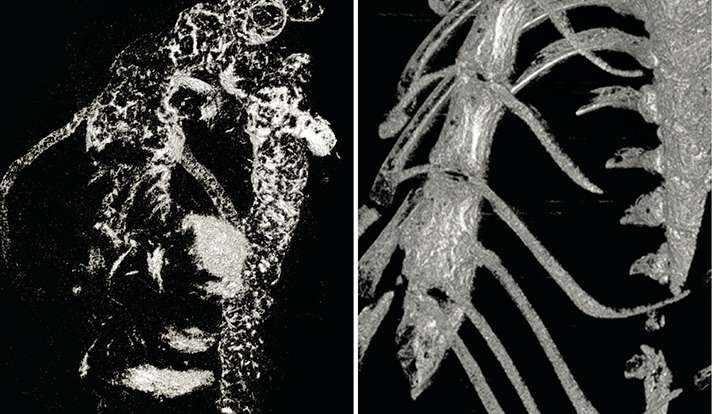Scientists study new therapy for lethal disease affecting infants

The majority of infants with the rare disease known as GACI (generalized arterial calcification of infancy) die within the first year of life. Now Yale scientists have developed and tested a therapy that not only targets the underlying cause of GACI but also eliminates mortality in rodent models of the human disease.
The research, led by associate professor of pathology Dr. Demetrios Braddock, was published Dec. 1 in Nature Communications.
Infant patients with GACI have arterial "calcifications," or abnormal buildup of calcium in blood vessels. The calcifications cause hardening of arteries, heart failure, and death in most cases. Treatment for GACI is currently limited to an intensive therapy that is minimally effective.
In their study, Braddock and his colleagues focused on an important yet poorly understood enzyme, ENPP1, which is impaired in GACI patients. The researchers injected GACI mice with daily doses of an ENPP1 therapy. They demonstrated that the therapy eliminated the calcifications as well as related heart disease and mortality.
"We show that the therapy is curative in GACI—there is no calcification and no death," said Braddock. "The key finding is that this lethal disease can be prevented with daily injections of this protein."
The next step, now that the therapy has been shown to be effective in preventing calcifications associated with the disease, noted Braddock, is to test whether the therapy can reduce or eliminate calcifications in other animal models. The ultimate goal of the research team is to test the therapy in humans with GACI.
These findings are likely to have applications in other severe clinical conditions, he said. "We believe that we can propose treating patients in renal failure suffering from vascular calcification with this therapy," Braddock noted. "We are optimistic that we will see a response."
More information: Ronald A. Albright et al. ENPP1-Fc prevents mortality and vascular calcifications in rodent model of generalized arterial calcification of infancy, Nature Communications (2015). DOI: 10.1038/ncomms10006
















